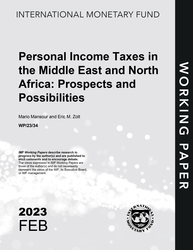
Personal Income Taxes in the Middle East and North Africa: Prospects and Possibilities
Personal Income Taxes in the Middle East and North Africa: Prospects and Possibilities
READ MORE...
Volume/Issue:
Volume 2023
Issue 034
Publication date: February 2023
ISBN: 9798400234583
$20.00
Add to Cart by clicking price of the language and format you'd like to purchase
Available Languages and Formats
| English |
Prices in red indicate formats that are not yet available but are forthcoming.
Topics covered in this book
This title contains information about the following subjects.
Click on a subject if you would like to see other titles with the same subjects.
Economics- Macroeconomics , Taxation - General , Economics / General , Personal income taxes , social security contributions , payroll taxes , fragile and conflict states , Middle East and North Africa , Gulf-Cooperation Council , SSC reform , SSC system , revenue performance , PIT objective , PIT revenue , Personal income tax , Income tax systems , Income , Income and capital gains taxes , Corporate income tax , North Africa , Middle East , East Africa , Global
Summary
Personal income taxes (PITs) play little or no role in the Middle East and North Africa, often yielding less than 2 percent of GDP in revenue—with the exception of few North African countries. This paper examines how PITs have evolved in recent decades, and what they might look like in the next 20 years. Top marginal tax rates on labor and business income of individuals have declined substantially, a trend that mirrors reductions in advanced and developing economies. Taxation of passive capital income has changed very little, and the revenue intake from this source remains low throughout the region (less than 1 percent of GDP on average and concentrated in oil-importing non-fragile states). Social security contributions (SSC) have increased in importance in nearly all MENA countries, and some countries have introduced additional payroll taxes. The combination of reduced marginal tax rates, light taxation of income from capital and business activities, and increase of SSC, have resulted in income tax systems that create disincentives to work and incentives for informality, and contribute little to government revenue and income redistribution. Given differences in economic and political structures, demographics, and starting points, the path to PIT/SSC reforms will vary across the region. Countries with relatively mature PIT/SSC systems, where revenue performance has improved in the past two decades, will increasingly need to balance the revenue and equity objectives against effciency objectives (in particular labor market incentives and infromality). Countries with no PITs will have to weigh whether a consumption tax/SSC system that mimic a flat tax on labor income is sufficient to diversify revenue away from oil and whether to adopt PITs to address rising income and wealth inequality. Finally, fragile states, who face more political volatility and weaker fiscal institutions, will have to focus on simplicity of tax design and collection to be able to raise revenue from PITs.
Copyright © 2010 - 2026
Powered by:
AIDC



